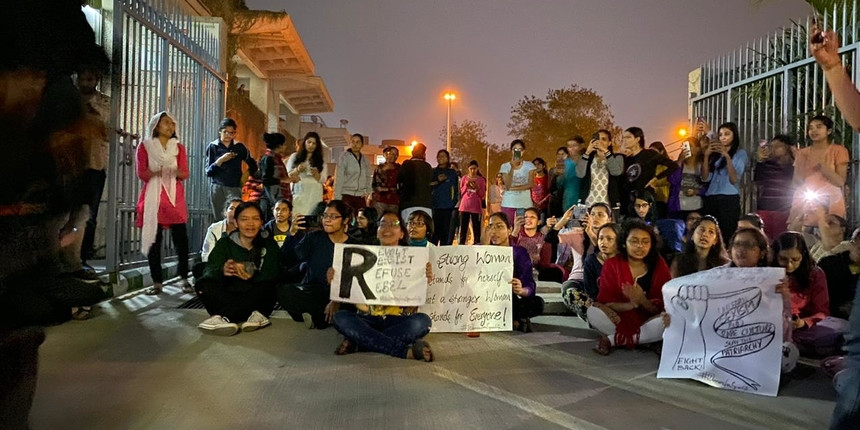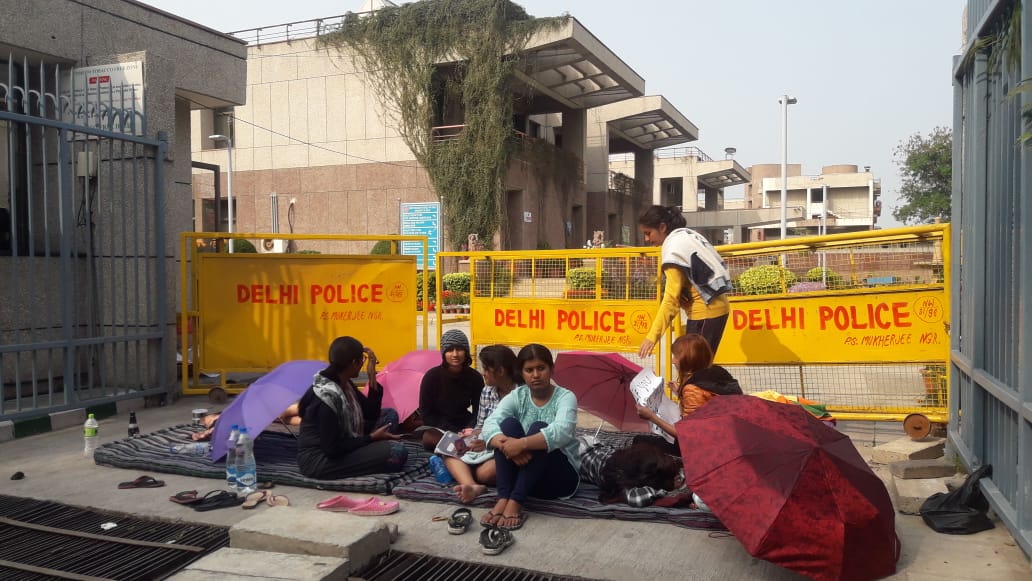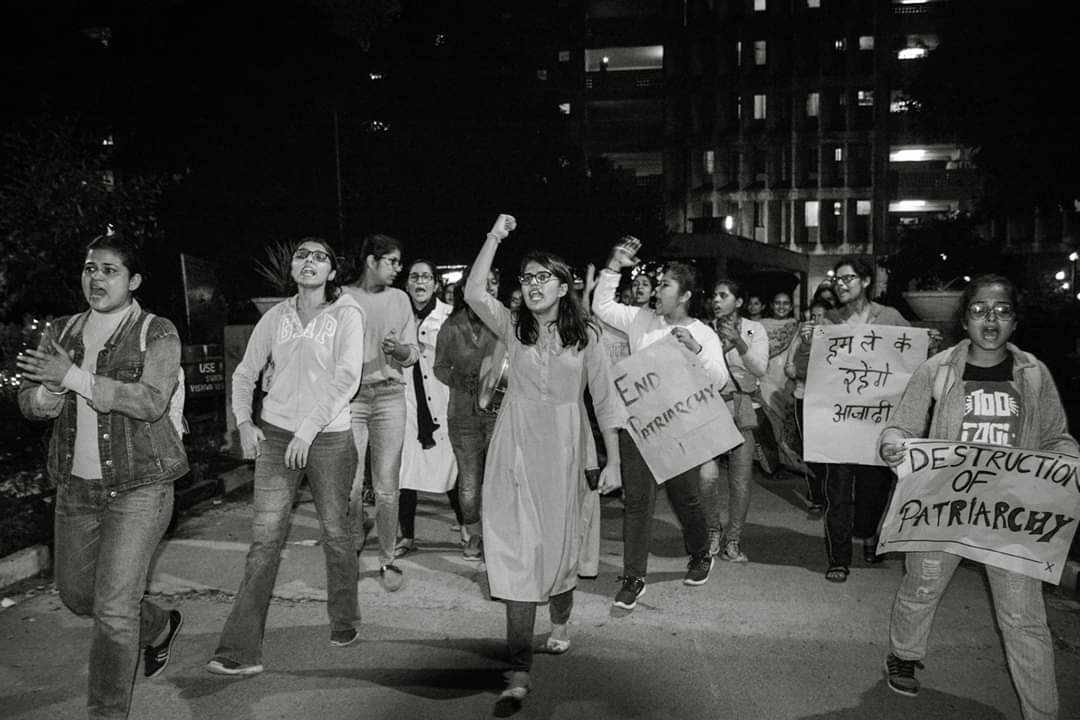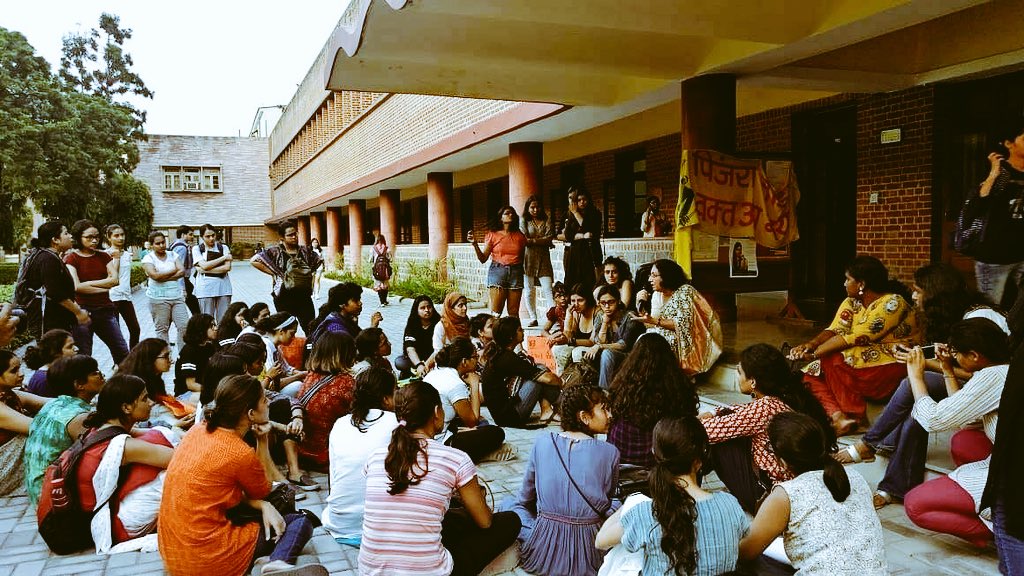Women’s Day: 7 years on, student fight for gender equality continues
Atul Krishna | March 7, 2020 | 03:12 PM IST | 4 mins read

NEW DELHI: Late on March 6, two days before the International Women’s Day, women students of Dhaka Hostel Complex in Delhi University entered their second week of protests against “arbitrary and discriminatory” hostel rules.
Students of five hostels have been on an indefinite sit-in in front of the main gate of the complex since February 27. Their main demand is relaxation of the 7.30 pm curfew imposed on the hostel residents.
The protests initially started as a response to a comments a hostel official allegedly made about students preparing for a “hostel night”. They allegedly said the students’ dresses were “very revealing” and that “a woman’s body should be a mystery”.
The students’ initial outrage at the comments has evolved into a charter of demands to put an end to the “discriminatory rule”.
A major demand is the implementation of the University Grants Commission’s Saksham report recommendations. The Saksham report, released in 2014, looked into the measures of ensuring women’s safety and gender sensitisation on university and college campuses. But seven years since deliberations began in 2013, women across campuses are still fighting for basic rights and equality.
Limiting opportunities
Students have pointed out that the restrictions are limiting their movements as well as their opportunities. For instance, Delhi University’s 24/7 library for postgraduate students become out-of-bounds for women hostellers due to the curfew.
“There is a contradiction within the rules itself. If women are not allowed to go out at night, the 24/7 library becomes for men only,” said Pallavi Raj, a resident of the North Eastern Students House for Women.
There are other “arbitrary” rules as well, students say. “The undergraduate hostels have a rule where if a meal is skipped, they have to pay a fine of Rs 100 which is hiked to Rs 500 the next day,” said Amisha Nanda, a first-year law student at the Faculty of Law.
The protests had some impact as the university provosts on February 29 put out a notice extending the hostel curfew to 11 pm. Students, though happy with the progress, say that the protests will continue till all of their demands are met.
But on one side as the hostel warden seemed to be easing up, students were also targeted.
 Students at the sit-in protest (Credit: Amisha Nanda)
Students at the sit-in protest (Credit: Amisha Nanda)
‘Sit in the hostel peacefully’
On March 2, the provost of North Eastern Students House for Women sent a notice to Raj for engaging in activities that allegedly caused “embarrassment” to the hostel.
On February 29, around 300 women students marched to the Vice-Chancellor’s office demanding the implementation of the Saksham report. When they returned, the gates to the undergraduate hostel were locked, essentially locking the residents out.
Raj along with other residents broke the lock open. Two days later, Raj received the notice which advised her to “focus on [her] studies” and “sit in the hostel peacefully”.
Students alleged they are being threatened and that their parents are being informed. “This is moral policing at its worst. If men had done it, would they have called their parents?” asked Raj.
Protests elsewhere
For the past five years, students in universities across the country have fought hostel curfews and rules that sought to restrict their movements and access to resources. The women’s group born in Delhi University, Pinjra Tod, galvanised many students in to action and extended support to protesters.
Since 2015, there have been protests by women on similar issues at Jamia Millia Islamia University, National Institute of Technology (NIT) Roorkee, Regional Institutes of Education in Bhopal, Ajmer and Bhubaneswar, Punjab University, Government Medical College, Kottayam in Kerala, Hidayatullah National Law University in Chhattisgarh, NIT Allahabad and Calicut, and Punjabi University in Patiala.
 Punjab University students breaking curfew. (Credit: Pinjra Tod)
Punjab University students breaking curfew. (Credit: Pinjra Tod)
‘Problem of protectionism’
This situation is precisely what the Saksham report hoped to address.
Following the horrific gang rape in Delhi on December 16, 2012, the UGC set up a ten-member task force to look into the situation in campuses across the country.
The task force was to study the shortcomings of the existing system of “gender sensitization and sexual harassment-related redressals on campuses” and “suggest measures to redress this”.
In the final report, released in 2014, the task force noted that “the weakest aspect of our institutions of higher education is their lack of gender sensitivity”.
 Protests against curfew in Delhi University (Credit: Pinjra Tod)
Protests against curfew in Delhi University (Credit: Pinjra Tod)
It found that among the 800 institutions that had participated in the surveys and open forums conducted by the task force 349 (44 percent) “admitted that they had differential timings, often amounting to at least one hour or more in the evenings” for men and women.
Some institutions required women to give a “notice well in advance” to a warden or proctor for staying out.
It gave ten recommendations, one of which is to stop “over monitoring or policing” that leads to the” curtailing the freedom of movement for women”.
Calling it the “problem of protectionism”, the report notes: “Campus safety policies should not result in securitization, such as over monitoring or policing or curtailing the freedom of movement, especially for women”.
It also recommends a “requisite number of female security personnel” and the gender sensitization of all security staff.
But six years later, the students are still fighting the same fight.
Write to us at news@careers360.com.
Follow us for the latest education news on colleges and universities, admission, courses, exams, research, education policies, study abroad and more..
To get in touch, write to us at news@careers360.com.